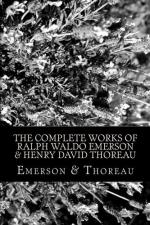|
This section contains 10,944 words (approx. 37 pages at 300 words per page) |

|
Dictionary of Literary Biography on Ralph Waldo Emerson
Ralph Waldo Emerson was not a practicing literary critic in the sense that Edgar Allan Poe and William Dean Howells were, and he was not a theorist as Immanuel Kant, Friedrich Wilhelm Joseph von Schelling or Friedrich Ernst Schleiermacher were. Yet he was for America what Samuel Taylor Coleridge was for England, the major spokesman for a new conception of literature. From his early essays on English literature and his important first book, Nature (1836), to his greatest single literary essay, "The Poet" (1844), to his late essays on "Poetry and Imagination" and "Persian Poetry" in 1875, Emerson developed and championed a concept of literature as literary activity. The essence of that activity is a symbolizing process. Both reader and writer are involved in acts of literary expression which are representative or symbolic. Emerson's position is an extreme one, and in A History of Modern Criticism (1965) René Wellek has said...
|
This section contains 10,944 words (approx. 37 pages at 300 words per page) |

|


